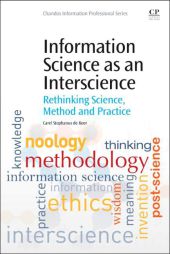 Neuerscheinungen 2015Stand: 2020-02-01 |
Schnellsuche
ISBN/Stichwort/Autor
|
Herderstraße 10
10625 Berlin
Tel.: 030 315 714 16
Fax 030 315 714 14
info@buchspektrum.de |

Fanie de Beer
Information Science as an Interscience
Rethinking Science, Method and Practice
2015. 156 S. 229 mm
Verlag/Jahr: CHANDOS 2015
ISBN: 0-08-100140-1 (0081001401)
Neue ISBN: 978-0-08-100140-0 (9780081001400)
Preis und Lieferzeit: Bitte klicken
Science is first and foremost an intellectual activity, an activity of thought. Therefore, how do we, as information scientists, respond intellectually to what is happening in the world of information and knowledge development, given the context of new sociocultural and knowledge landscapes? Information Science as an Interscience poses many challenges both to information science, philosophy and to information practice, and only when information science is understood as an interscience that operates in a multifaceted way, will it be able to comply with these challenges. In the fulfilment of this task it needs to be accompanied by a philosophical approach that will take it beyond the merely critical and linear approach to scientific work. For this reason a critical philosophical approach is proposed that will be characterised by multiple styles of thinking and organised by a compositional inspiration. This initiative is carried by the conviction that information science will hereby be enabled to make contributions to significant knowledge inventions that may bring about a better world. Chapters focus on the rethinking of human thinking, our unique ability that enables us to cope with the world in which we live, in terms of the unique science with which we are involved. Subsequent chapters explore different approaches to the establishment of a new scientific spirit, the demands these developments pose for human thinking, for questions of method and the implications for information science regarding its proposed functioning as a nomad science in the context of information practice and information work. Final chapters highlight the proposed responsibility of focusing on information and inventiveness and new styles of information and knowledge work.
focuses on rethinking information science to achieve a constructive scientific approach
provides an alternative methodological approach in the study of information science
shows how a change in scientific approach will have vast implications for the understanding and dissemination of knowledge
presents the implications of a new approach for knowledge workers, and the dynamics of their work
explores the future of thinking about science, knowledge and its nature and the ethical implications
1. An acritical philosophy of information 2. Towards the idea of information science as an interscience 3. Information science in a post-scientific position: Part 1: The limitations of science and information science 4. Information science in a post-scientific position: Part 2: The conditions for an alternative 5. Method/beyond-method: the demands, challenges and excitements of scholarly information work 6. Methodology and noology: Amazing prospects for library and information science 7. Let the new knowledge come: the atlas of knowledges 8. The contemporary knowledge worker (the troubadour of knowledge): comprehensive and exciting challenges 9. A proposed philosophico-ethical approach towards the electronic information era
de Beer, Fanie
Carel S. (Fanie) de Beer is Emeritus Professor at the Department of Information Science, University of South Africa (Unisa), Pretoria, South Africa, and is currently an Extraordinary Professor of Information Science at the University of Pretoria. He graduated in Agriculture and Philosophy (doctoral studies) at the University of Pretoria and the University of Paris X. Nanterre, France. He has taught Philosophy, Communications and Information Science at various universities, undertaken research in all these fields, and was involved in consultancy work in the fields of knowledge generation, invention, dissemination and application. His research interests include the philosophy and theory of information, philosophies and theories of technics and technology, and knowledge invention, dissemination and utilization. He is also committed to research on reading theory and on the re-invention of human spirituality and noology.


